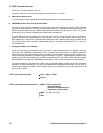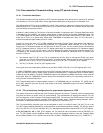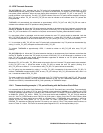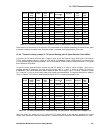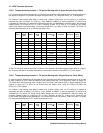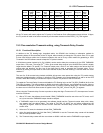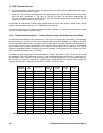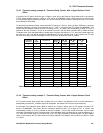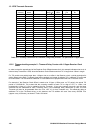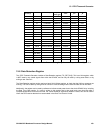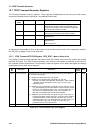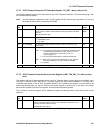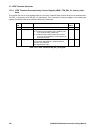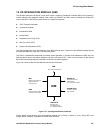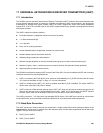
15: 1PPS Timemark Generator
162 GP4020 GPS Baseband Processor Design Manual
Timemark
Event (s)
TIC
Event
TIC Time (s) Required
delay (µs)
TIM_DEL
value
TIM_DEL
_LO
TIM_DEL_
HI
0 0 0 0 40000 0x9C40 0x40
1 10 0.9999965 3.5 40140 0x9CCC 0x40
2 20 1.999993 7 40280 0x9D58 0x40
3 30 2.9999895 10.5 40420 0x9DE4 0x40
100 1000 99.999650 350 54000 0xD2F0 0x40
101 1010 100.9996465 353.5 54140 0xD37C 0x40
182 1820 181.999363 637 65480 0xFFC8 0x40
183 1830 182.9993595 640.5 65620 0x0054 0x41
1000 10000 999.996500 3500 180000 0xBF20 0x42
1001 10010 1000.996497 3503.5 180140 0xBFAC 0x42
10000 100000 9999.965000 35000 1440000 0xF900 0x55
10001 100010 10000.9649965 35003.5 1440140 0xF98C 0x55
28571 285710 28570.9000015 99998.5 4039940 0xA504 0x7D
(SKIP TIC) 285720 28571.899998 100002.0 4040080 0xA590 0x7D
28572 285721 28571.99999765 2.35 40094 0x9C9E 0x40
28573 285731 28572.99999415 5.85 40234 0x9D2A 0x40
Table 15.7 TIC delay calculations for Timemark, using Delay Counter - TIC period with +2.5ppm error
15.5.5 Timemark setting example 8 - Timemark Delay Counter with -2.5ppm Receiver Clock
Offset
In order to show the opposite end of the Receiver Clock Offset tolerance limit, this example indicates what to do in
order to keep Timemark at 1PPS, when the Receiver Clock Offset means that TIC is longer than 100ms in length.
For TIC period errors which larger than -1.00ppm due to an offset in the Receiver clock, a similar technique for
adding delays to the RAW_Timemark signal can be applied, but instead of skipping TICs, additional TICs will need
to be introduced. The rate at which additional TICs are added will be proportional to the error in Receiver Clock.
For example, if the Receiver Clock Offset is noted to be -2.5ppm (+250ns error on TIC period), the actual TIC
period is 0.10000015s. This means that the correction needed at each TIC to align to UTC, is -150ns, and
consequently a delay of -1.5µs is needed at the first Timemark, -3.0µs at the second time-mark, and the same
increment will be subtracted for each Timemark event. If the calculated delay decrements to zero, the next
Timemark will need to be generated after nine TICs, NOT 10, for that Timemark only. This effectively adds an
additional TIC to the Timemark timing. In this instance, the TIC addition will occur once every 660,000 TICs
(approx. every 18.5 hours), as shown in Table 15.8 below.



